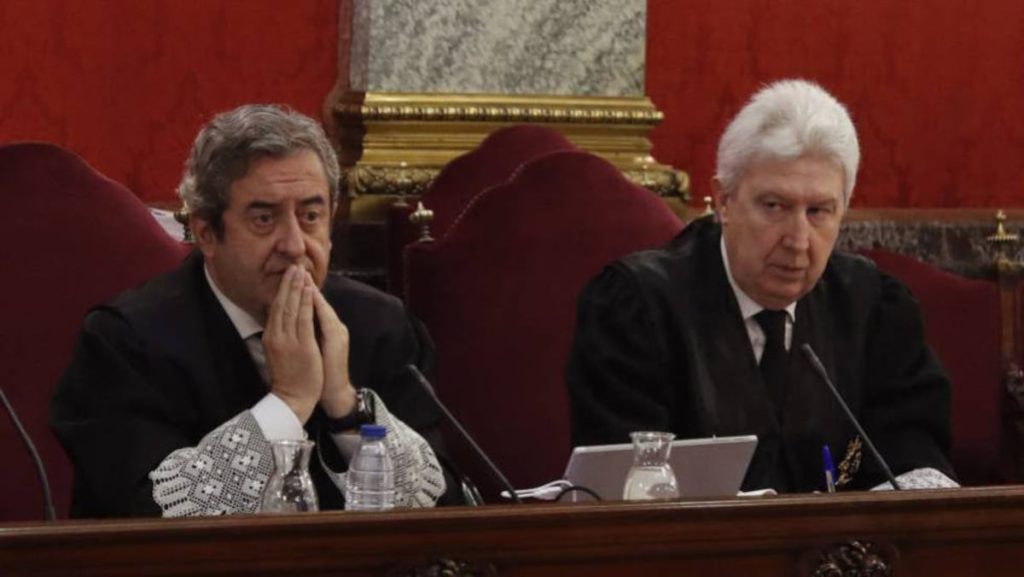The approval of the amnesty law in Congress on Thursday is likely to result in a harsh confrontation within the Public Prosecutor’s Office. Prosecutors from the Supreme Court who participated in the trial of the procés in 2019 have informed the Attorney General, Álvaro García Ortiz, that they believe the amnesty law does not apply to the embezzlement charges for which four of the 12 separatist leaders were convicted, including Oriol Junqueras, and which the court also attributes to Carles Puigdemont. The prosecutors argue that the embezzlement convictions cannot be nullified because the diversion of funds proven in the Supreme Court’s ruling falls within the exceptions specified in the amnesty law. Furthermore, they claim that the arrest warrant against the former Catalan president—who fled to Belgium in 2017—cannot be automatically lifted, contrary to what the law stipulates once it is published in the Official State Gazette (BOE) and comes into effect.
The decision by the Supreme Court on the application of amnesty to embezzlement charges will not only affect Puigdemont’s case but also the sentence Oriol Junqueras is still serving for disqualification from holding public office. Junqueras was pardoned in 2021 for his prison sentence but not for the disqualification. Prosecutors of the procés support the application of amnesty for disobedience and public disorder offenses, the other charges attributed to the separatist leaders after the reform that abolished the crime of sedition in 2022.
The approval of the amnesty law in Congress closes the parliamentary process and marks the beginning of the implementation phase by the Judiciary. For the law to take effect, it must be applied by each court that has issued a sentence or is handling a case that could be affected by the amnesty. The Prosecution Service plays a role in this phase, as judges must seek their non-binding opinion before making a decision. Since the proposition of the law was announced, there have been evident disagreements within the Public Prosecutor’s Office, resulting in public statements and criticisms of García Ortiz for refusing to submit the report on the amnesty as requested by the Senate, where the PP holds a majority.
In the end, it will be the Attorney General who has the authority to determine the position of the Prosecution Service regarding the amnesty. García Ortiz has been cautious about the grace measure so far and has refrained from commenting on its scope until the courts begin to apply the law. However, sources close to him suggest that his stance differs from that of the procés prosecutors and he believes the embezzlement attributed to Puigdemont or Junqueras falls under the amnesty umbrella because it did not result in personal enrichment, a condition required by the law to benefit from the amnesty. If García Ortiz sets this criteria, all prosecutors would theoretically have to comply, as hierarchical dependence is a key principle of the Prosecution Service.
The amnesty law stipulates that embezzlement of public funds will be pardoned if it was used to finance acts linked to the procés and “provided that there was no intention of personal enrichment.” The intention of the Government and its parliamentary allies is for the grace measure to apply to all those charged in the independence challenge, including those accused of embezzlement. One view within the Prosecution Service argues that the law clearly states that there must have been an increase in wealth, which did not occur in the procés case. However, another sector, led by the procés prosecutors, believes the opposite, based on Supreme Court jurisprudence that enrichment does not only refer to personal gain but to other types of benefits as well. They also invoke a 2017 EU directive that prohibits pardoning offenses affecting the Union’s financial interests, a provision included in the amnesty law.
The procés prosecutors have maintained a tough stance against the separatist leaders since 2017, and their criticism of the amnesty law is more politically motivated than legal. They argue that the law was not part of the electoral debate in the 2023 general elections and claim that social rejection of the grace measure is widespread. They characterize the law as arbitrary and a result of political opportunism, designed to satisfy the political interests of the parties that agreed on the law. The prosecutors also contend that the law lacks political consensus and was crafted by those who benefit from the amnesty, implying it was tailored to suit ongoing judicial developments.


